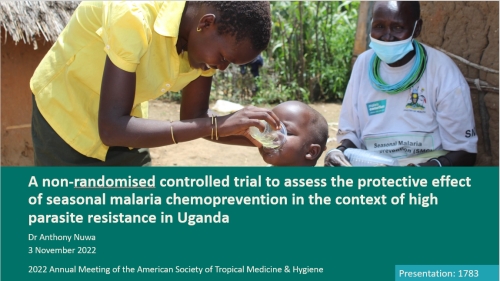Publications

Publication Date:
03/11/2022
Author:
Anthony Nuwa
Type:
Presentation

A non-randomised controlled trial to assess the protective effect of SMC in the context of high parasite resistance in Uganda
Publication Date:
03/11/2022
Author:
Anthony Nuwa
Type:
Presentation

Publication Date:
03/11/2022
Author:
Anthony Nuwa
Type:
Presentation
Publication

A non-randomised controlled trial to assess the protective effect of SMC in the context of high parasite resistance in Uganda
Publication Date:03/11/2022
Author:
Anthony Nuwa
Type:
Presentation
With the National Malaria Control Division, we conducted an SMC implementation study in Karamoja, where parasite resistance is assumed to be high.
Malaria is major public health problem in Uganda, affecting almost 100 percent of the population. The National Malaria Control Division and Malaria Consortium conducted a seasonal malaria chemoprevention (SMC) implementation study in Karamoja, where parasite resistance is assumed to be high. Results indicated children in intervention districts had a 92.2 percent lower risk of developing confirmed malaria in the five-month follow-up versus those in the control district.
This presentation was given at the 71st annual meeting of the American Society of Tropical Medicine and Hygiene.
Country: Uganda
Keywords: Malaria | Research | SDGs | SMC
« Back to Publications